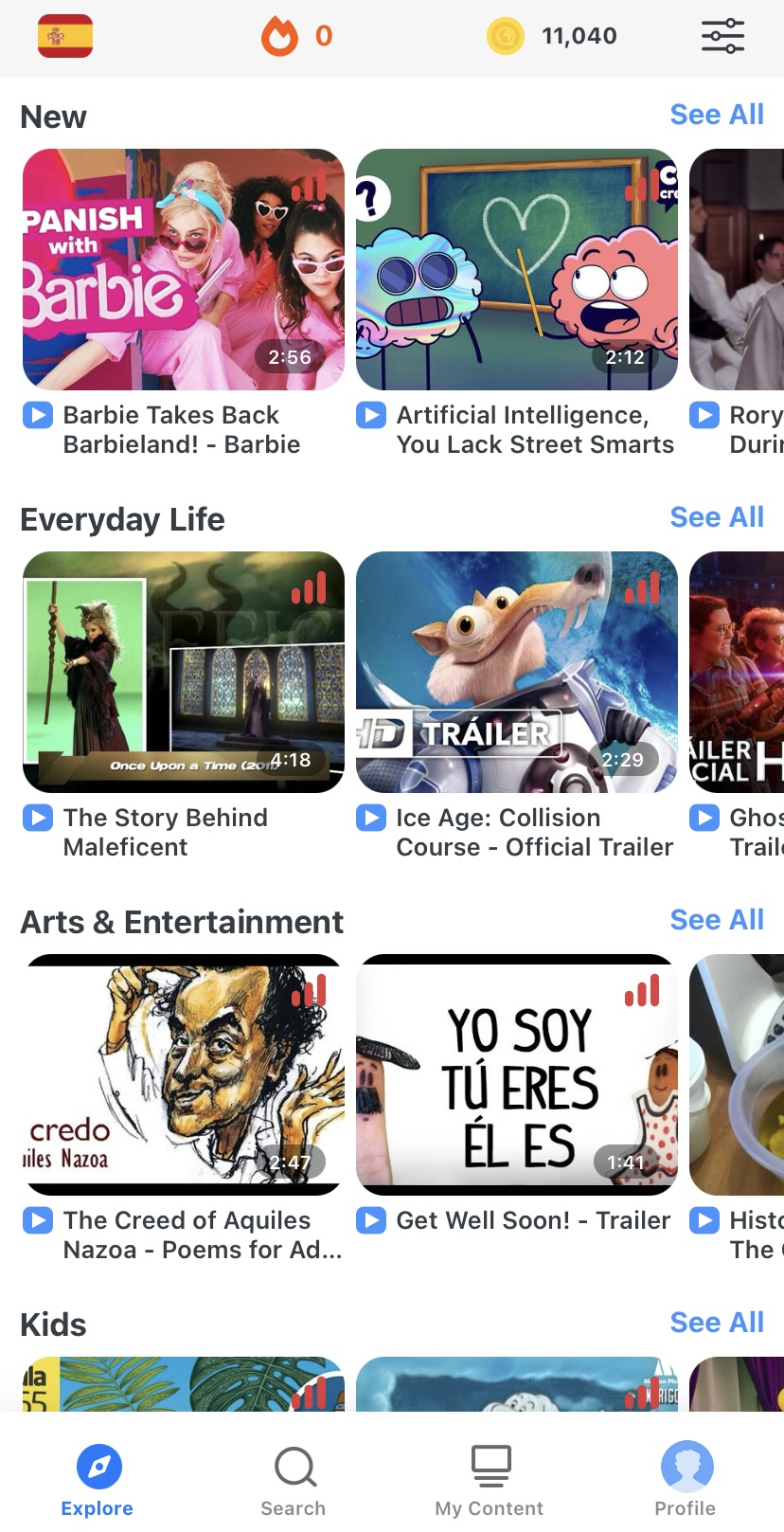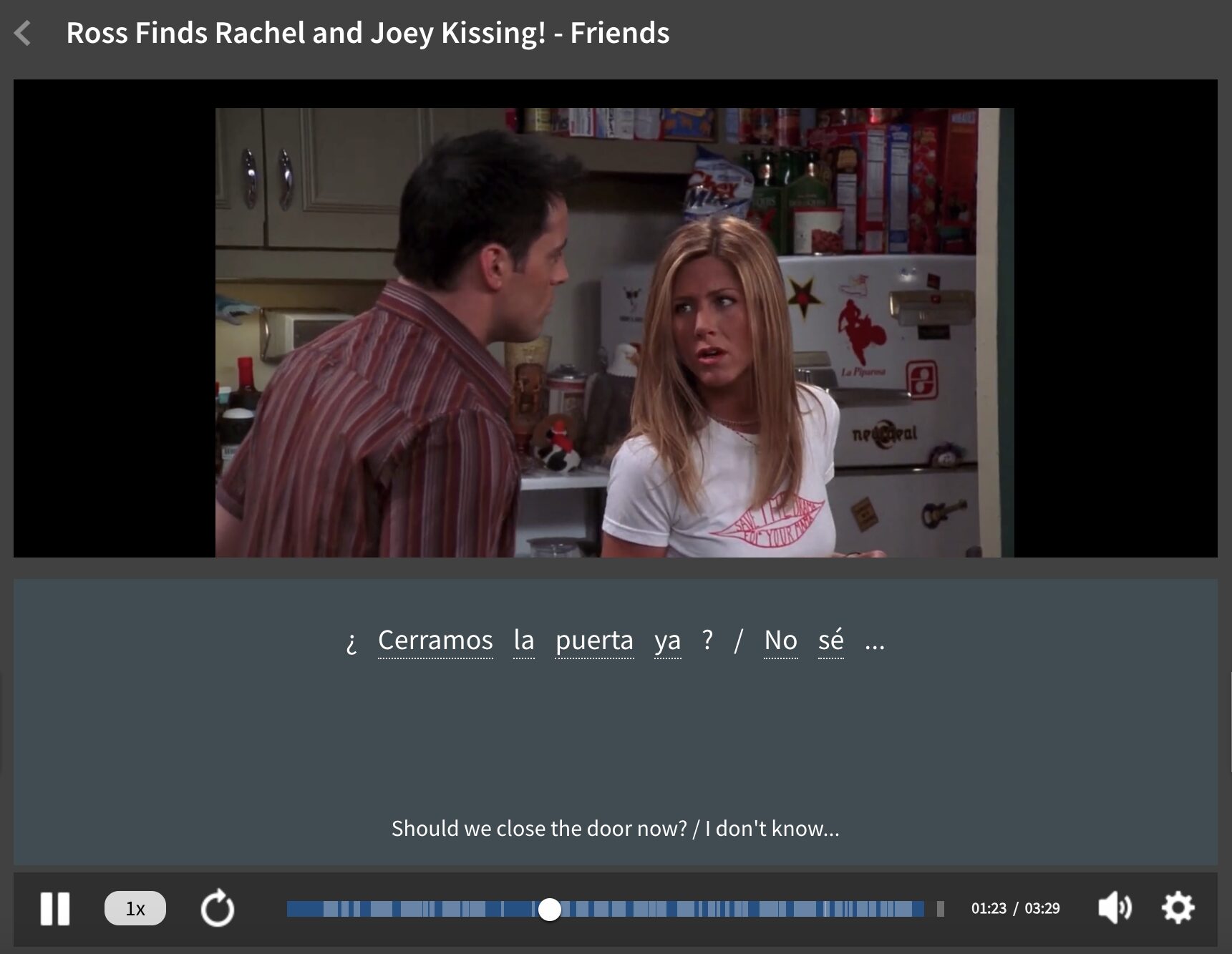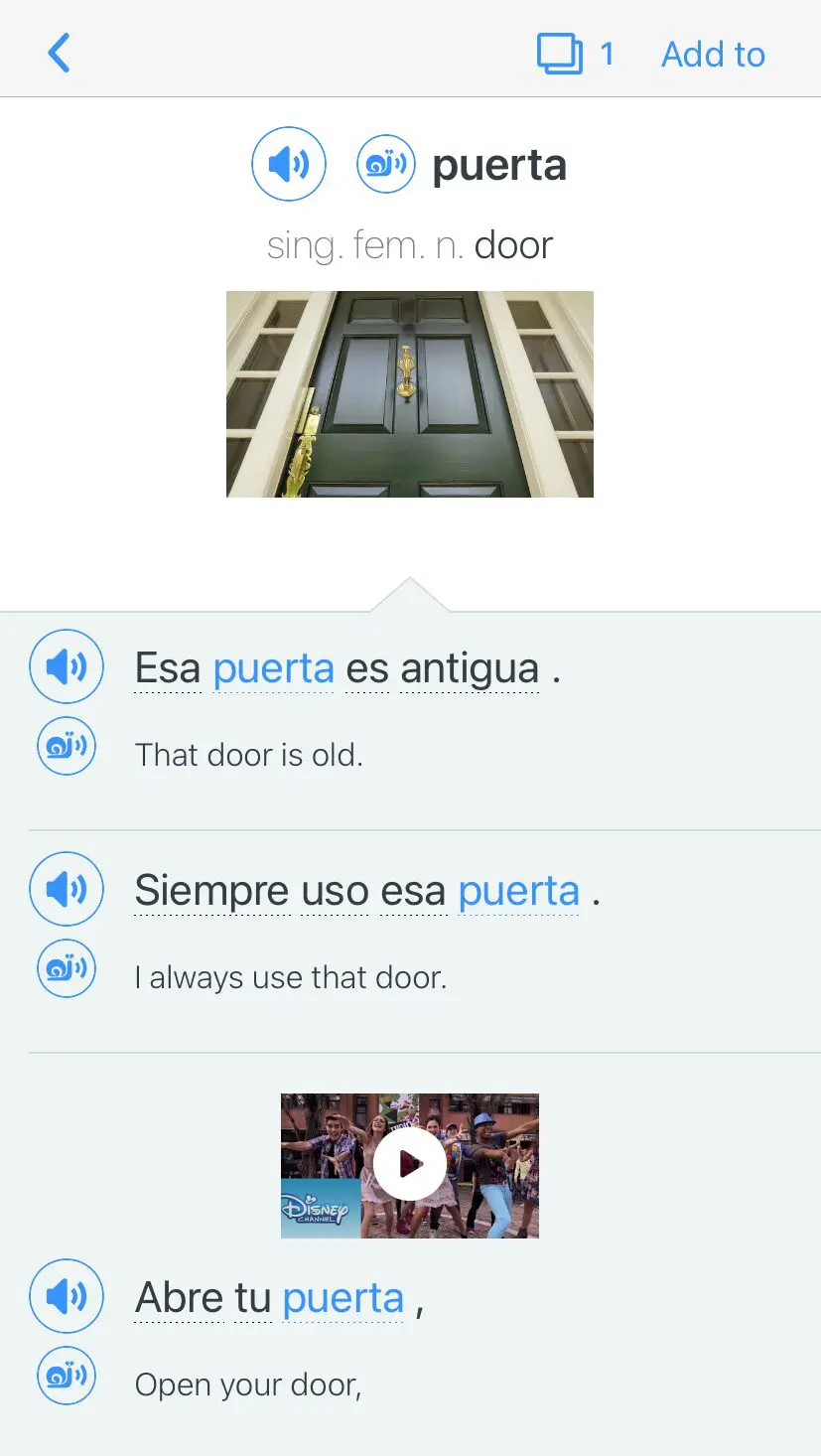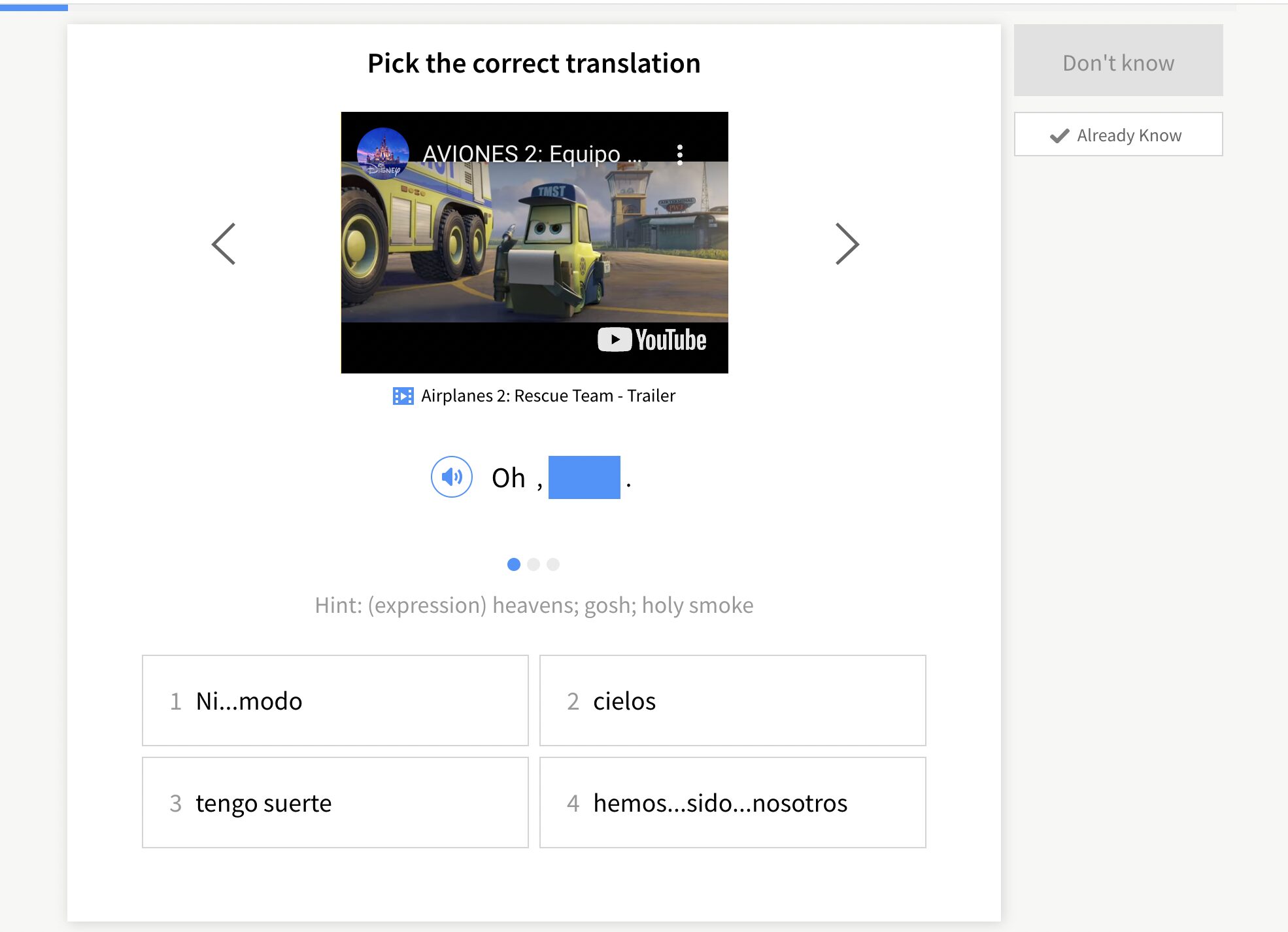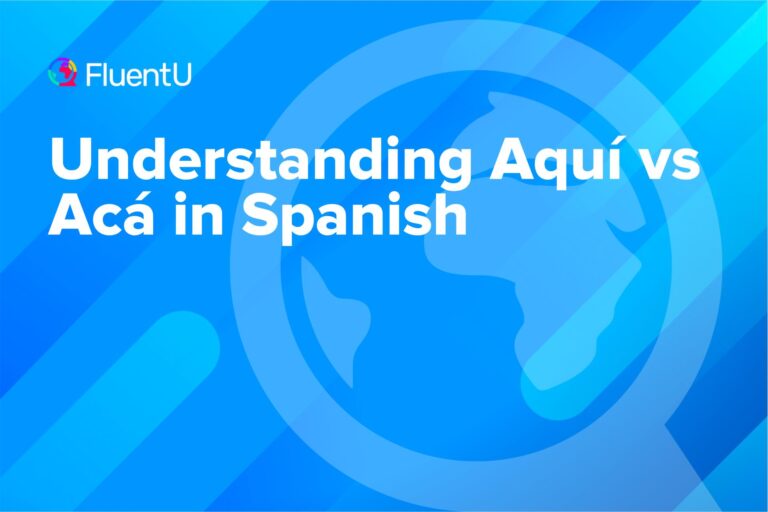Contents
- 1. Take advantage of patterns between Portuguese and Spanish
- 2. Beware of those tricky falsos amigos
- 3. Memorize these pronunciation hacks
- 4. Watch out for typical mistakes
- 5. Dare to speak with natives
- 6. Pick a country and explore
- Why You Should Stop Speaking Portuñol and Learn Spanish
- And One More Thing…
Spanish for Portuguese Speakers: Vocab and Pronunciation Advice

It’s no secret that Portuguese and Spanish are as similar as sister languages can be. Often seen as the improvised, clever, easy solution, Portuñol can even become a fun game between Portuguese- and Spanish-speaking peoples—but is it really better than speaking actual Spanish?
I definitely believe learning Spanish is way more effective, logical and useful, so keep reading to find six tips on how to learn Spanish as a Portuguese speaker.
Download: This blog post is available as a convenient and portable PDF that you can take anywhere. Click here to get a copy. (Download)
1. Take advantage of patterns between Portuguese and Spanish
Spanish presents a variety of common patterns that will help you translate directly from Portuguese and still make sense. While you should try your best to learn case-by-case and avoid making assumptions about new words, don’t miss the chance to take advantage of obvious patterns! Here are some of the most helpful ones:
- Portuguese words that finish in -ão tend to finish in -ión in Spanish:
| Portuguese | Spanish | English translation |
|---|---|---|
| nação | nación | nation |
| coração | corazón | heart |
| razão | razón | reason |
| intenção | intención | intention |
- An -ável or -ível ending in Portuguese is likely to become -able and -ible in Spanish:
| Portuguese | Spanish | English translation |
|---|---|---|
| inevitável | inevitable | inevitable |
| invisível | invisible | invisible |
| comparável | comparable | comparable |
- A -dade ending in Portuguese is likely to become a -dad in Spanish:
| Portuguese | Spanish | English translation |
|---|---|---|
| cidade | ciudad | city |
| actividade | actividad | activity |
| sociedade | sociedad | society |
2. Beware of those tricky falsos amigos
If saying you’re pregnant when you would like to express how embarrassed you are (embarazada vs. embaraçada) were not bad enough, Portuñol may lead you down other dark paths.
Trying to say a girl is cute ( gira ) but end up calling her a “tour” ( gira )?
Want to ask for more ( mais ) but end up asking for “corn” ( maíz )?
Want to order an octopus dish ( polvo ) at the restaurant but end up ordering “dust” ( polvo )?
Since you’re thinking of investing in the Spanish language and already know your way around a conversation, why not start with some common false friends you can avoid? After all, false friends may seem convenient, easy going and even fun to be around… but who says they will not hang you out to dry later?
3. Memorize these pronunciation hacks
While vocabulary can be tricky in Spanish when you’re already a Portuguese speaker, pronunciation can also be an immediate giveaway that your Spanish skills are in need of a brush-up!
Here are three pronunciation hacks for Portuguese speakers to develop a Spanish tongue:
- Keep that “r” on the tip of your tongue! While the Portuguese language has an incredible variety of “r” sounds depending on your location and the position within a word, Spanish is much simpler and homogenous across the world when it comes to this letter. Just say it on the tip of your tongue.
Sometimes the “r” will be stronger, when it’s at the beginning of a word like radio (radio) and raro (strange), or when there are two in a row like arroz (rice) and barrio (neighborhood).
However, if used in the middle or ending of a word, the sound will be softer. Try saying hablar (to talk), cantar (to sing), estudiar (to study) or cocinar (to cook).
- Spice up your ch. The Portuguese language is particularly famous for its “shhh” sound at the beginning, middle and end of several words. In contrast, Spanish mostly goes for a “tsh” sound that is way more pronounced when the letters ch appear.
The name of the country Chile would then be pronounced “tshile” rather than “shile.” The words mucho (a lot) and charlar (to chat) will be pronounced with a sound similar to the one in the English “church.”
- Cover your nose, open your mouth! The Portuguese language is a concert of nasal sounds, from -ão to -ãe to -em! However, Spanish does not use this type of sound, so get used to opening up your vowels!
Words like mãe (mother), sem (without), tem (has) or quem (who) become madre , sin , tiene and quién . It might seem strange at first, but the absence of nasal sounds is actually quite convenient for Portuguese speakers who are learning Spanish!
Interested in knowing some more about pronunciation in Spanish? Try starting with some fun Spanish words that are sure to “un-twist” that tongue in no time!
4. Watch out for typical mistakes
Mistakes are common when learning any language and you should not beat yourself up over them. However, when aware of common slippery roads, you can try avoiding them altogether! Here are four common mistakes Portuguese speakers make when adventuring into Spanish:
- Using lo instead of el. Because the Spanish language uses the article los for masculine plurals, such as los amigos
(the friends), los errores
(the mistakes) and los zapatos
(the shoes), we tend to believe lo would be the logical article to talk about the masculine singular. Lo amigo, lo error, lo zapato, right?
Definitely not! Whenever the intention is to talk about “the” object, make sure to use el, the correct form. For example: El coche es mío. (The car is mine.)
- Going double. In Portuguese you would say professor (teacher), assassino (killer), profissional (professional) and isso (that). In Spanish, however, you must use profesor , asesino , profesional and eso . Watch out for these tricky letters and try keeping things simple.
- Using -ue for everything. Escola
translates to escuela
(school), conta
translates to cuenta
(bill), fogo
translates to fuego
(fire). So… why does copo
(glass) not become cuepo?
This mistake is particularly common when conjugating irregular verbs, so feel free to check the most common irregular verbs and how to use them!
- Using q where it does not exist. Oh boy! Watch out for quando , quanto , quarto and qual (when, how many, room, which one)! If you prefer to keep your written communication smooth, keep your c where it belongs: cuándo , cuánto , cuarto and cuál !
5. Dare to speak with natives
Sometimes we are just too reserved or shy to approach native speakers. What if we sound ridiculous? What if finally we realize our knowledge of Spanish was nothing but an illusion, or feel overwhelmed by how much we still have to learn?
Think about it this way: It’s not a test, it’s a tool… and the best of tools, because you’ll be making new friends!
The best part about talking to native Spanish speakers is turning language into something more material and present, perhaps even a face you can associate with your goal. A conversation partner could challenge you, keep you accountable and help you understand a certain culture from up close.
If you enjoy personal contact and meeting people on a regular basis, perhaps it would be a good idea to find a Facebook group dedicated to Spanish learning in your area. Meetup is also a great place to start for regular in-person language learning meetings!
If you still feel that you’re not ready to approach people face-to-face, start by testing the waters with language exchange platforms.
Of course, sometimes we just need a break from socializing—or we need to squeeze in some Spanish practice on our own schedule, between meetings or early in the morning. For those times, an immersive learning program like FluentU will give you native Spanish practice on your own.
FluentU takes authentic videos—like music videos, movie trailers, news and inspiring talks—and turns them into personalized language learning lessons.
You can try FluentU for free for 2 weeks. Check out the website or download the iOS app or Android app.
Click here to take advantage of our current sale! (Expires at the end of this month.)

6. Pick a country and explore
If you’re a native Portuguese speaker or have come to master Portuguese as a foreign language, you’re aware of the incredible diversity within the language.
You could feel connected to European Portuguese, Brazilian Portuguese or Portuguese from Angola, Cabo Verde (Cape Verde), Moçambique (Mozambique), Guiné-Bissau (Guinea-Bissau) or São Tomé e Príncipe (São Tomé and Príncipe).
Similarly, Spanish can take you on a journey around the world: From Spain to Mexico, Paraguay, Colombia, Venezuela or Nicaragua, you should feel free to explore the nuance, beauty and individuality of cultures you believe speak to you the most.
Why not start with some slang from Panama? Why not color your day with some Puerto Rican sweetness or even get ready for El Salvador? The world is an open door and Spanish certainly is a golden key!
Why You Should Stop Speaking Portuñol and Learn Spanish
Be understood… actually understood
Let me tell you about the time that I, a Portuguese speaker, traveled to Madrid alone for a weekend.
There, I met a wonderful guide named Estefânia. She told me my Spanish was awesome and that she was pleasantly surprised… because the Portuguese speakers she meets usually pretend they speak Spanish… and she just pretends to understand what they say!
Ouch.
As much as you try communicating with Portuñol or Portuguese, a good amount of what you say will go unnoticed or misunderstood by a Spanish speaker. In the best of cases you’ll be able to have a regular conversation with lots of missing content. In the worst, people will think you’re pregnant (Spanish: embarazada ) when you just want to say you’re embarrassed (Portuguese: embaraçada ).
Learning Spanish will let you communicate with nuance, detail, humor and subtlety without the awkwardness of a blank stare.
Rock that job interview
Hey, Portuguese-speaking job seekers, I’m talking to you!
Remember those times you added “Spanish skills” to your resume with a smirk on your face? Admit it—you knew your grasp of Spanish was mostly made possible by some cartoons, a couple of movies, improvisation, talking to one or two tourists, some days of vacation abroad and possibly endless plays of “Despacito” on repeat against your will.
But not anymore.
Learning Spanish will help you become an effective communicator with Spanish-speaking clients or colleagues and maybe even explore new job markets with your Spanish-speaking awesomeness!
It will also show your employer that you’re committed, culturally aware, understand the value of Spanish in the workplace and have an interest in communicating successfully rather than just surviving through a conversation with Spanish speakers.
Speaking of which, because you’re a Portuguese speaker, employers are likely to double-check the Spanish skills you claim to have on your CV, because they think you’re more likely to go for Portuñol to make your life easier!
So… ready to prove them wrong?
Discover more about yourself and your heritage
There is a reason that Portuguese and Spanish are so similar.
To study Spanish is to recognize the cultural tie between the Spanish- and Portuguese-speaking worlds. You’ll engage with the history of power struggles, territorial disputes, separation, cultural influences (from theater to literature and music), union and collaboration across Spain, Portugal, Brazil and other Latin American countries.
You may even discover some facts about your own history you were not aware of!
If you’re interested in the culture of Spain in particular, Instituto Cervantes (Cervantes Institute) regularly organizes events, courses and workshops surrounding Spanish history, entertainment and heritage.
The similarities make Spanish easier to learn
Most foreign language learners would confirm there are few things more de-motivating than spending months or even years learning a language… only to see that you’re going absolutely nowhere.
This is the case particularly with languages that require learning a new alphabet.
If you’re a Portuguese speaker, however, you’re already one step ahead when attempting to learn Spanish. The alphabet is practically the same, pronunciation can be attained pretty quickly, the languages are extremely similar in terms of vocabulary and you can already understand most of it without even trying! For example:
| Portuguese | Spanish | English translation |
|---|---|---|
| casa | casa | home |
| amigo | amigo | friend |
| restaurante | restaurante | restaurant |
| música | música | music |
| sabor | sabor | flavor |
| amor | amor | love |
| aprender | aprender | to learn |
Just be aware that these same similarities can also pose a challenge. Between false cognates, tricky expressions and different ways of spelling words that sound absolutely similar, Spanish will give you that comforting feeling of investing in something familiar while keeping things entertaining and unexpected.
As I discuss more below, you’ll have to stay alert and avoid common traps.
Now that you’re ready to put an end to pain-inducing, discomposing, awkward sessions of Portuñol, the world should be getting ready for your mad Spanish skills!
¿Listo? (Ready?)
Download: This blog post is available as a convenient and portable PDF that you can take anywhere. Click here to get a copy. (Download)
And One More Thing…
If you’re like me and prefer learning Spanish on your own time, from the comfort of your smart device, I’ve got something you’ll love.
With FluentU’s Chrome Extension, you can turn any YouTube or Netflix video with subtitles into an interactive language lesson. That means you can learn from real-world content, just as native speakers actually use it.
You can even import your favorite YouTube videos into your FluentU account. If you’re not sure where to start, check out our curated library of videos that are handpicked for beginners and intermediate learners, as you can see here:
FluentU brings native Spanish videos within reach. With interactive captions, you can tap on any word to see an image, definition, pronunciation, and useful examples.
You can even see other videos where the word is used in a different context. For example, if I tap on the word "puerta," this is what pops up:
Want to make sure you really remember what you've learned? We’ve got you covered. Practice and reinforce the vocab from each video with learn mode. Swipe to see more examples of the word you’re learning, and play mini-games with our dynamic flashcards.
The best part? FluentU tracks everything you’re learning and uses that to create a personalized experience just for you. You’ll get extra practice with tricky words and even be reminded when it’s time to review—so nothing slips through the cracks.
Start using the FluentU website on your computer or tablet or, better yet, download our app from the App Store or Google Play.
Click here to take advantage of our current sale! (Expires at the end of this month.)
